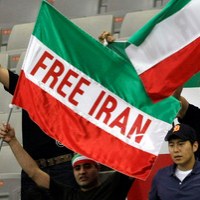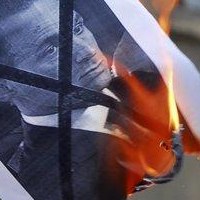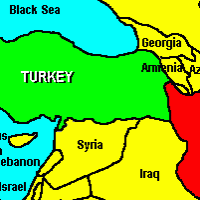![]()
Sun, Aug 22, 2010 | The Meir Amit Intelligence and Terrorism Information Center
Conservative Camp Steps Up Criticism of Ahmadinejad
Accusing him of straying from principles of conservative camp
Criticism of President Ahmadinejad by the conservative camp has reached new peaks this week. In an extended interview granted by conservative Majles member Ali Motahari to Soroush, a weekly affiliated with Iran Broadcasting, he claimed that the president and his supporters do not represent a conservative view but rather a separate extremist view. He went as far as to compare their worldview with that of Furqan, a radical Islamic group which assassinated several top regime officials after the Islamic revolution, including Motahari’s father, the top cleric Ayatollah Mortaza Motahari. According to Motahari, the views held by the president and his supporters are based on an independent interpretation of Islam; also, they do not consider the top clerics to be particularly important and are not committed to the concept of “rule of the religious jurisprudent” (Velayat-e Faqih) in light of their messianic notions.
Motahari further stated that the only reason why most clerics support the president and his government is that the government has the support of the Supreme Leader—support stemming from considerations that involve the interests of the regime. Not only does the criticism against the president and his government not weaken the conservatives, he claimed, it actually makes them stronger, and if all conservatives followed the radical views espoused by the president’s supporters, there would be nothing left of the conservative camp.
Speaking about the differences of opinion between the government and the Majles, Motahari said that the Majles must exercise independent judgment about the president, and that Ahmadinejad’s tendency to ignore laws approved by the Majles may pave the way to dictatorship. Motahari also commented on the president’s backing last week of his office chief Rahim Masha’i following the outrage sparked by his statement during a Tehran convention of Iranians residing abroad. Masha’i, who has already been the center of several scandals in the past, announced during the convention that Iran has to spread “Iranian thought” in the world and to give it preference over “Islamic thought”. His statement was strongly criticized by senior officials in the conservative camp and in the religious establishment, who accused him of encouraging secular nationalist views and offending Islam. However, the president took Masha’i’s side last week and said that he had his complete confidence, adding that the attacks against him were the work of certain political groups seeking to undermine the government (Mehr, August 11).
Commenting on the affair, Motahari said that Masha’i’s statement and the president’s support of him go against the principles of Islam. He noted that if such things had been said when the reformists were in power, the conservatives would have taken to the streets (Aftab-e Yazd, August 14).
The president’s decision to support his office chief also came under criticism from other Majles members. Majles member Gholam Reza Mesbahi Moqaddam said this week that instead of justifying Masha’i, the president would have done better if he had instructed him to take back his words, which go against national interests and the ideology of the revolution. He noted that several Majles members wrote a letter of protest to the president because of the affair, asking him to reprimand Masha’i for his statement (Fararu, August 15).
Ahmad Tavakoli, who chairs the Majles Research Center and is considered to be one of the president’s strongest critics in the conservative camp, also lashed out against the president in view of the differences of opinion between the government and the Majles on the division of authority in the legislation process. Tavakoli criticized the president’s disregard for laws approved by the Majles and the Guardian Council, accused the president of being stubborn, and said that he has a tendency of thinking too highly of his personal interpretation of the law.
This criticism was also shared by Majles member Parviz Sorouri, who said that it was not in the president’s power to make decisions on the implementation of laws already approved by the Majles and the Guardian Council. He stressed that if the president does not sign draft laws within a certain period of time, the Majles speaker has the right to enact that law, which at that point becomes binding on all executive agencies in the country (Mehr, August 14). Hojjatoleslam Seyyed Mohammad Sa’idi, the Friday prayer leader in the city of Qom, also implicitly criticized the president, saying that nobody is exempt from the duty of implementing laws that have been approved by the relevant instances (Fars, August 13).
The comments made by Majles members Motahari and Tavakoli provoked strong reactions from government supporters, who claimed that they served the interests of Iran’s enemies who aimed to create discord among top regime officials. Mohsen Kuhkan, a member of the Majles Presiding Board, noted that there is a difference between criticism and personal attacks, and that any action that weakens the president is improper. According to Kuhkan, the style of criticism used by the two Majles members is improper and does not help solve the issues. Majles member Fatemeh Alia also strongly criticized the comments made by the two Majles members, saying that Motahari should be brought to trial for his statements and accusations against the president (IRNA, August 15).
Even as criticism continues to build against the president, the weekly Yaltharat al-Hossein, affiliated with the ultra-conservative group Ansar Hezbollah, has reported this week that during a secret meeting held in early 2010 between Supreme Leader Ali Khamenei and a group of conservative Majles members, whose topic was the political crisis in Iran after the presidential elections, the Supreme Leader once again expressed his support of President Ahmadinejad. In an interview held by the weekly with conservative Majles member Hamid Rasa’i, the president’s supporter said that in response to criticism against government policy voiced by some Majles members during the meeting, the Supreme Leader said that while there may be some problems with the government’s functioning, on the whole its advantages far outweigh its disadvantages. The Supreme Leader stressed the need for fighting the reformist opposition, saying that efforts must be focused on uprooting the fundamental causes of the reform movement rather than putting the opposition leaders to trial. He claimed that if the reform movement had been dealt with at the root after the student demonstrations in July 1999, Iran would not have been facing a new political crisis ten years later (Jaras, August 14).



 RSS
RSS











Conservative Camp Steps Up Criticism of Ahmadinejad #freeiran #ahmadinejad http://j.mp/bdt20x
RT @CrethiPlethi: Conservative Camp Steps Up Criticism of Ahmadinejad #freeiran #ahmadinejad http://j.mp/bdt20x